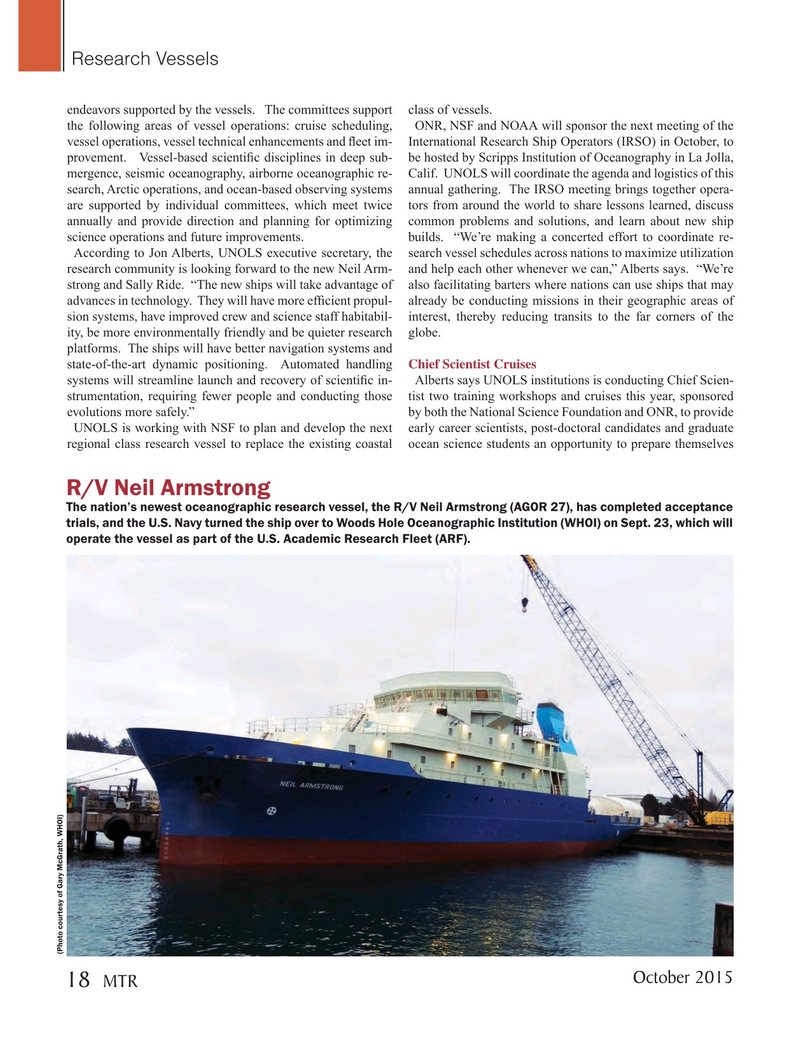
Page 18: of Marine Technology Magazine (October 2015)
AUV Operations
Read this page in Pdf, Flash or Html5 edition of October 2015 Marine Technology Magazine
Research Vessels endeavors supported by the vessels. The committees support class of vessels.
the following areas of vessel operations: cruise scheduling, ONR, NSF and NOAA will sponsor the next meeting of the vessel operations, vessel technical enhancements and ? eet im- International Research Ship Operators (IRSO) in October, to provement. Vessel-based scienti? c disciplines in deep sub- be hosted by Scripps Institution of Oceanography in La Jolla, mergence, seismic oceanography, airborne oceanographic re- Calif. UNOLS will coordinate the agenda and logistics of this search, Arctic operations, and ocean-based observing systems annual gathering. The IRSO meeting brings together opera- are supported by individual committees, which meet twice tors from around the world to share lessons learned, discuss annually and provide direction and planning for optimizing common problems and solutions, and learn about new ship science operations and future improvements. builds. “We’re making a concerted effort to coordinate re-
According to Jon Alberts, UNOLS executive secretary, the search vessel schedules across nations to maximize utilization research community is looking forward to the new Neil Arm- and help each other whenever we can,” Alberts says. “We’re strong and Sally Ride. “The new ships will take advantage of also facilitating barters where nations can use ships that may advances in technology. They will have more ef? cient propul- already be conducting missions in their geographic areas of sion systems, have improved crew and science staff habitabil- interest, thereby reducing transits to the far corners of the ity, be more environmentally friendly and be quieter research globe. platforms. The ships will have better navigation systems and state-of-the-art dynamic positioning. Automated handling Chief Scientist Cruises systems will streamline launch and recovery of scienti? c in- Alberts says UNOLS institutions is conducting Chief Scien- strumentation, requiring fewer people and conducting those tist two training workshops and cruises this year, sponsored evolutions more safely.” by both the National Science Foundation and ONR, to provide
UNOLS is working with NSF to plan and develop the next early career scientists, post-doctoral candidates and graduate regional class research vessel to replace the existing coastal ocean science students an opportunity to prepare themselves
R/V Neil Armstrong
The nation’s newest oceanographic research vessel, the R/V Neil Armstrong (AGOR 27), has completed acceptance trials, and the U.S. Navy turned the ship over to Woods Hole Oceanographic Institution (WHOI) on Sept. 23, which will operate the vessel as part of the U.S. Academic Research Fleet (ARF).
(Photo courtesy of Gary McGrath, WHOI)
October 2015 18
MTR
MTR #8 (18-33).indd 18 9/29/2015 1:15:33 PM

 17
17

 19
19
